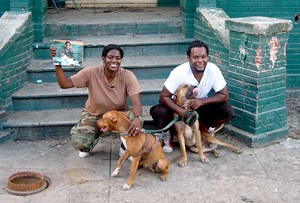Published October 29, 2008 at 5:32 a.m.
If you’ve seen horror films composed of faked first-person video footage, such as Cloverfield, The Blair Witch Project and the recent Quarantine, your first question was probably “Who keeps the camera running in a situation like that?”
The answer is: a person like Kimberly Rivers Roberts. True, the young resident of New Orleans’ Ninth Ward didn’t film her flight from zombies or skyscraper-squashing amphibians. But what Roberts did capture in August 2005 — floods turning her street into a river; rain trickling into her attic refuge — is a good deal scarier, given that it’s real.
Three years after Hurricane Katrina, we’ve all seen news footage and documentaries and postmortem analyses. But Trouble the Water still feels current, partly because of the harrowing immediacy of that amateur footage, and partly because Roberts and her husband Scott are such compelling personalities on their own. Documentarians Tia Lessin and Carl Deal went to New Orleans hoping to make a film about the belated return of the Lousiana National Guard, but couldn’t get access to soldiers. So they hung out at a Red Cross shelter where, in the film’s first scene, we see Kim commandeer the camera, promising them footage like nothing they’ve seen before.
If the twentysomething seems like a bit of a huckster, that could be because she’s eager to get into the entertainment business: One thing she managed to salvage from the storm is a homemade hip-hop CD she recorded as Black Kold Madina. Kim Roberts is one of those larger-than-life people the camera loves: She’s the “real deal” yet never stops performing, figuring out ways to shape and dramatize her own story. In footage from August 28, after the evacuation order but before the storm hit, Roberts tours her neighborhood with a camera she recently bought for $20, playing the part of a news reporter: “This is Kimberly Rivers Roberts, reporting live!” She plays pundit, too, exhorting kids not to imitate the drunk passed out on a stoop, or proclaiming in the convenience store, “We’re going to show the world there was a world before the storm.”
This pre-storm footage is powerful, because there’s something very human about the mixture of excitement and fatalism with which Roberts and her neighbors anticipate Katrina. Kim and Scott weren’t model citizens (both admit they’ve dealt drugs), and they’re the sort of people the media generally ignore. All of a sudden, they’re in the path of something big, terrifying and newsworthy, and their only option is to stick it out. (Roberts did try to rent a car for evacuation, but her credit wasn’t good enough.)
Once the levees break, the story becomes one of solidarity and survival — and, eventually, of return and rebuilding. Roberts shot about three hours before her tape ran out; Lessin and Deal extracted 15 minutes and edited it together with archival materials and their own footage as they followed the couple over a two-year span. There’s no direct footage of Kim and Scott escaping the flood, but we come to know the people they befriend in the process, such as Brian, a recovering addict whose thoughtful glumness is a nice counterpoint to Kim’s “praise-the-Lord” optimism. We also see the ravaged Ninth Ward two weeks after Katrina, when the Robertses used Lessin and Deal’s media access to return to their home.
The directing duo produced Bowling for Columbine and Fahrenheit 9/11 for Michael Moore, and their editing sometimes shares his heavy-handedness. When a New Orleans tourism rep delivers a pie-eyed spiel about how the city has fully recovered, then dances to a promotional video in which everyone but the jazz musicians is white, the filmmakers’ point is sound, but their irony is cheap.
Far more moving are the stories of the people the city’s PR spinmeisters have no use for, and they also deliver the strongest indictments. One of Kim’s relatives sums up what she learned from Katrina: “If you don’t have money or status, you don’t have a government.”
More By This Author
Speaking of Movies, movie Review
-

Next Month Brings the Final Curtain for Palace 9 Cinemas
Oct 27, 2023 -

Book Review: 'Save Me a Seat! A Life With Movies,' Rick Winston
Aug 30, 2023 -

Steve MacQueen Named Executive Director of Vermont International Film Festival
May 22, 2023 -

Vermonters Are Going Back to the Movies — Under the Stars
Aug 26, 2020 -

Where to Catch a Movie Near Burlington
Sep 11, 2018 - More »
Comments
Comments are closed.
From 2014-2020, Seven Days allowed readers to comment on all stories posted on our website. While we've appreciated the suggestions and insights, right now Seven Days is prioritizing our core mission — producing high-quality, responsible local journalism — over moderating online debates between readers.
To criticize, correct or praise our reporting, please send us a letter to the editor or send us a tip. We’ll check it out and report the results.
Online comments may return when we have better tech tools for managing them. Thanks for reading.












































